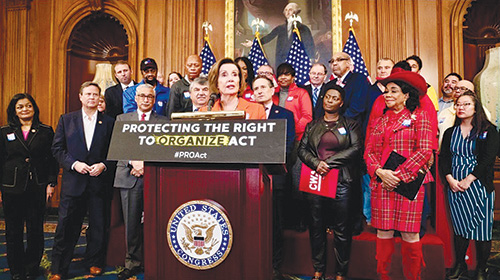By CARL GREEN
Illinois Correspondent

The St. Louis region’s representatives in Congress voted true to their parties’ positions Feb. 6 in the House’s passage of the PRO Act, a strengthening of Labor unions and their members.
The Democrats voted for it, but every Republican representing this region voted against the measure to protect the rights of working people.
The PRO Act is the “Protecting the Right to Organize Act,” or HR 2474, and it passed the House on a 224-194 vote, mostly along party lines. The Washington Post called it, “one of the most significant bills to strengthen workers’ abilities to organize in the past 80 years.”
WHAT THE PRO ACT WOULD DO FOR WORKERS
Here’s what it would do:
- Company fines – The bill would allow the National Labor Relations Board to fine companies up to $50,000 per violation for retaliation such as firing workers who start union campaigns. Without the fines, companies can now ignore Labor laws with little concern.
- Retaliation – The bill would award workers’ compensation for damages workers experience when companies retaliate against them for organizing, in addition to the back pay and reinstatement they now are entitled to.
- Employee status – The bill would reclassify gig workers such as those at Lyft or Uber from being contractors to being employees, thus allowing potentially millions of workers the right to form or join unions.
- Bargaining – The bill would require employers to bargain in good faith and prevent them from permanently replacing strikers. Workers could file lawsuits over National Labor Relations Act violations.
- “Right-to-Work” – The bill would override so-called “right-to-work” laws in the 27 states that have them by establishing that employers and unions in all 50 states may agree upon a “fair share” clause requiring all workers who are covered by — and benefit from — the collective bargaining agreement to contribute a fair share fee towards the cost of bargaining and administering the agreement.
“This is the most ambitious Labor law reform to get to the floor of the House in a very long time,” Sharon Block, executive director of the Labor and Worklife Program at Harvard Law School, told the Washington Post. “I think it’s really important.”
MORE LIKELY TO JOIN
“If we get it passed, it means Americans will be much more likely to join a union,” said the chairman of the House Committee on Education and Labor, Rep. Robert C. Scott (D-Va.).
“Right now only 10 percent are in unions. That’s primarily because of the difficulty there is to forming a union,” he said. “A lot of it is because of the lack of deterrence from unfair labor practices.”
Economic Policy Institute research indicates that of companies now involved in union elections, 40 percent are charged with violating federal laws during the election campaigns.
Business opponents of the bill formed a so-called “Coalition for a Democratic Workforce” to fight the bill, complaining that employers would have to provide lists of employees’ jobs, shifts, cell phone numbers and addresses to union leadership before an election.
They need not worry, at least for now. Republicans who control the Senate promised that they will never bring the bill up for consideration. It would take Democratic majority leadership to move this through.
In Missouri, Rep. Lacy Clay (D-St. Louis) voted for the bill. The state’s other Democrat, Emanuel Cleaver of Kansas City, did not vote. All six of the Republican representatives voted against it, including Ann Wagner of Ballwin (up for election this November).
In Illinois, the vote was party-line, with all three of the Republicans who represent southern Illinois and the Metro East voting against workers, including Mike Bost of Murphysboro, John Shimkus of Collinsville and Rodney Davis of Taylorville. The 13 Illinois Democrats voted for the bill and the four Republicans voted against it, making it as clear which party has the interests of workers at heart.
“We will continue to organize and mobilize on this important issue as it moves to the Senate,” said Tim Drea, president of the Illinois AFL-CIO. “With an income equality gap at a record high and an economy that increasingly leaves people behind, empowering workers to join together, bargain for a fair return on their work and hold employers accountable has never been more important.”
IT’S ABOUT DEMOCRACY
The online publication The Hill said the bill is about democracy as much as the workplace.
“The fact remains that labor unions are one of the few tools we have for organizing vast numbers of relatively less-powerful people and channeling their numbers into power and voice in our democracy,” The Hill story said. “Mitch McConnell may never give a vote to the PRO Act in the Senate, but Democrats in the House have set down a marker – that they are not going to let Republicans continue to rig our economy and our democracy.”


